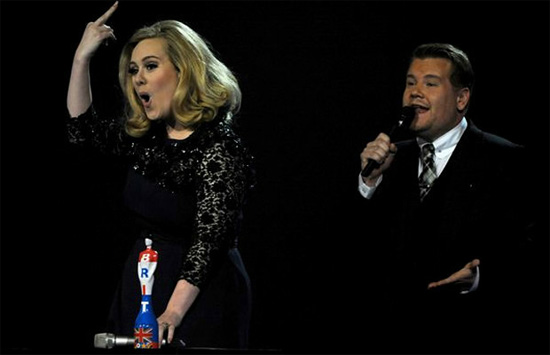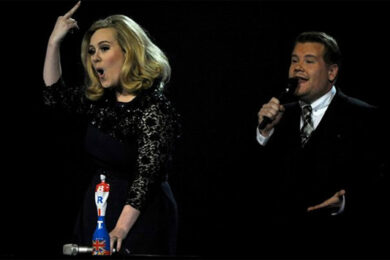Swearing pop stars… You’ve got to love them. Yesterday, I posted a screengrab of one to my Facebook wall. Bouffy-haired and Buttercup-eyelashed, there she was. Chewing a swarmful of wasps, her middle finger defiant. Within minutes, the ‘piss-off’ post was ‘liked’ by my teenage-years boss, my baby brother, and Pete Wylie from the Mighty Wah! Yes, I know Adele isn’t John Lydon. She’s not GG Allin either. But nor was she making a showy gesture of entitlement, which someone who unites the generations like she does, and who has helped revitalise UK and US music sales, could very easily, and understandably, do.
Here’s the thing: Adele is a pop star we need. She is a pop star we should rally behind, not just in terms of her often-fanfared status as a one-woman cash vache. Because pop isn’t just about music (although I’ll come to the music soon enough). It’s a whole culture, and it’s our culture – although it’s driven these days, far too often, by bland images, dull ‘personalities’ and sets of focus-grouped values. But Adele’s not. We expect world-straddling pop phenomenon to accept awards with soulless thank-yous delivered by Autocue and Autotune, not with the words, “’Ello! Aha, ooh m’God!”, before telling Kylie she looked stunning like a proud aunt, and then adding, bloody perfectly, “I feel like a drag queen next to you!” Multi-million-sellers don’t usually fan their necks like music-hall queens, or sweat off their eyebrows. Neither do they react, bar landlady-style, from the gut – fuck you, innit – when ITV pull the plug. But Adele does. She is Marie Lloyd-meets-Queenie Watts, in glittery sequins, gone global. A reminder of ordinary British icons as they were, and as they still can be.
But yes – and stop the carping, I’m coming to it – what about the songs? Surely ‘Someone Like You’ is the song that needs to die, with its planet-smothering arpeggios, and that soaring, beseeching chorus. Possibly, but listen closer. Adele wrote the lyrics to this song when she was 21 (and yes, they were brushed up a little later with Semisonic’s Dan Wilson, but Adele plays piano and clarinet, has learned songcraft at the Brit School, and gets criticised far more often for doing co-writes than her male equivalents do). But as a song, it is wise. It plays to different generations in the line about her ex-boyfriend’s new status – that tiny pause for breath in the middle of “you’re… married now”, is a gulp-in-the-throat, million-dollar moment. It also reveals how its subject “heard” about this change – it didn’t come from her ex’s mouth – showing that their distance is palpable. It also works because of the urgency in Adele’s voice: her character turns “up out of the blue, uninvited”, because she “couldn’t stay away”, she “couldn’t hide it”. And it works because of that brilliant “Never mind…” at the start of the chorus, the attempt to cloak feelings that can’t hide a girl giving up. Yes, Adele could work on her enunciation, especially in the chorus’ last line (when she sings “sometimes it lahhh in love”, not ”lasts” – I’m a sucker for a proper sibillant). But to make a proper pop standard at this stage of her career, full of nuances, speaks volumes about her.
Personally, I could take or leave the rest of 21, apart from two other tracks: ‘Rolling In The Deep’ and ‘Rumour Has It’. Sure, ‘Rolling In The Deep’’s chorus holds an echo of the Rolling Stones’ ‘Gimme Shelter’, but it’s Adele’s urgency as a singer, once again, that really bites; her heart sounds like it’s racing with the beat of the drum. ‘Rumour Has It’ possesses similar teeth, plus a great lyrical conceit: a woman talking about rumours that an old flame wants to run back to her, before the middle-eight reveals who the rumour-spreader really is. “Just ‘cos I said it, don’t mean I meant it,” Adele’s character sings, her words weighed down the sadness, before the drum hits her hard again.
This is the Adele I love. Everything else on the album – a sweet cover of The Cure’s ‘Lovesong’ aside, a tribute to her mum, a huge fan of the band – treads wet, ballady water. But this was Adele two years ago, a little scared of stretching herself. I interviewed her in December 2010 for The Gentlewoman magazine, where she was literally and metaphorically unpolished, having her nails varnished for a photoshoot, and foundation “whacked over me spots”. She talked about how she naturally wrote sad songs when she was by herself – such was her lack of confidence, she said, that she would bury into herself. But her co-writers and producer Rick Rubin would encourage her to let rip, which she enjoyed too – although she felt she needed the endorsement of others to do so. Man alive, does she have that endorsement now.
That morning, she also berated critics who lumped female artists together, an issue many other female artists I’ve spoken to have sidestepped. “The whole thing was crazy”, she said. “As if the world was surprised there were female singers. And I was like, Hello! Joni Mitchell, Janis Joplin – we ain’t got shit on them lot. Why are you making such a big deal of us? Journalists were just really treating our gender like a genre.” She also talked of how hard she had fallen for the music of the South – about her Tennessee-born US tourbus driver, Bee, who played country and Southern soul on his tape deck as they travelled. She talked about how true these sounds rang in her bones. She also talked about her desire to go to musical cities and study their heritage: “Austin or Nashville, or even Manchester or Birmingham, places with real musical history”.
And although I doubt that 24 ½ will be a faithful tribute to Midlands heavy metal, Adele’s interest in different styles is still something she cherishes. It is something she still wants to reveal, as she did on US TV last week, on prime-time CBS documentary show 60 Minutes. Taking veteran presenter Anderson Cooper to Rough Trade in West London’s Talbot Road, she revealed that she worked there secretly for a few months, sorting and labelling CDs in the back room, fearful of losing touch with new music. And when did this happen? Just after coming back from the US in 2009, just having won her first Grammys.
And this is what she said to me last winter, not knowing about the year that would be coming, as her eyelashes were being curled. “I don’t think you can ever know enough about your craft. I want to work hard. I want to do things properly.”
Tell me another modern pop star that would say that, and have substance behind the statement. A pop star that hasn’t compromised, or tried to tailor, her personality in interviews one bit. Who hasn’t compromised her image in any major way either – she has lost some weight, sure, but she’s hardly a “skinny minny”, as she’s put it – but currently features on the cover of American Vogue. That’s American Vogue. The benchmark of haute couture, of tailored sophistication. Showcasing a Tottenham-born, Mitcham-bred, size 16 cackler, who took a baffled US presenter to an indie record shop just because she felt like it.
Adele has done exactly what she wanted to do. And when she was allowed to talk on Tuesday, – before that first, Kylie-presented Brit – she thanked the people who had helped her. To her record company, XL: “Thank you for letting me be the kind of artist I always wanted to be.” And to her fans: “No one’s ever made me feel like I have to be any different.”
That’s why people have embraced Adele. That’s why ITV shouldn’t have cut her off in mid-flow, when she was saying she was proud to be British, and “proud to be in the room with all of you”. She has humility, hubris, and a hell of a musical future. Adele is the whole fucking package, and can be for everyone. I swear.



